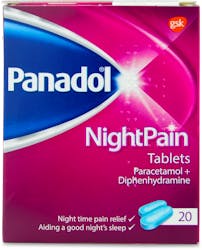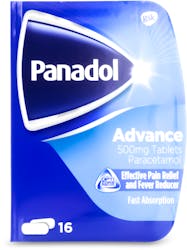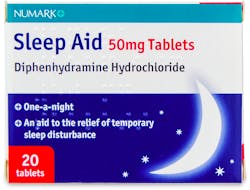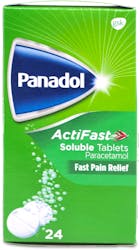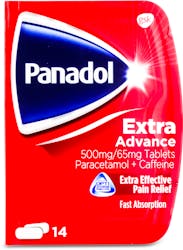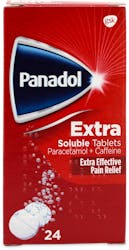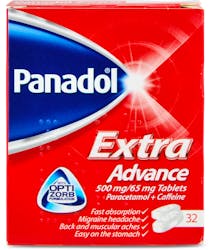Panadol Nightpain 20 Tablets
Panadol Nightpain 20 Tablets
What 500,000+ customers say about medino:
Get notified when back in stock
Description
Panadol Nightpain 20 Tablets are crafted to diminish nighttime discomfort, ensuring a serene slumber. Suited for individuals over the age of 16, it is particularly beneficial for those grappling with headaches, musculoskeletal pain, or any sleep-disturbing ailments. The formula's strength stems from its blend of paracetamol and diphenhydramine hydrochloride, which together offer pain alleviation while encouraging drowsiness. For those kept awake by relentless back pain or sporadic toothaches, Panadol Nightpain promises a restful night, allowing you to wake rejuvenated and without discomfort.
Key features
- Alleviates nocturnal discomforts including headaches, back pain, and dental pain.
- Comprises 500mg of paracetamol for pain alleviation and fever reduction.
- Contains 25mg of diphenhydramine hydrochloride, a sedative antihistamine.
- Appropriate for adults and teenagers over 16 years.
- Quick-acting, facilitating pain relief and expediting sleep.
- Recommended for temporary use, with a limit of 2 tablets per night for up to 7 consecutive nights without consulting a doctor.
What symptoms or conditions can be treated with Panadol Nightpain?
Panadol Nightpain effectively addresses nocturnal discomforts like headaches, musculoskeletal pain, backache, rheumatic pains, muscle aches, menstrual pains, and dental pain.
What are the benefits of using Panadol Nightpain?
Its benefits encompass swift and potent pain alleviation, which aids in falling asleep more effortlessly and enhances sleep quality when discomfort might otherwise cause restlessness.
How does Panadol Nightpain work?
It merges paracetamol, which mitigates pain and potentially lowers fever, with diphenhydramine hydrochloride, a sedative antihistamine that promotes sleep, facilitating easier rest despite pain.
Can I take Panadol Nightpain with other medications?
It is advised to avoid concurrent use of other medicines containing paracetamol or sedative antihistamines. Always seek guidance from a healthcare professional before mixing medications.
Can I take Panadol Nightpain if I am pregnant or breastfeeding?
Panadol Nightpain is not recommended during pregnancy or breastfeeding. Seeking advice from a healthcare professional is suggested to explore suitable pain relief options during these periods.
Ingredients
Active ingredients:
Each tablet contains Paracetamol 500mg and Diphenhydramine Hydrochloride 25mg.
Other ingredients:
Maize starch, starch pre-gelatinised, potassium sorbate (E 202), povidone, purified talc, stearic acid, hypromellose (E 464), titanium dioxide (E 171), lactose monohydrate, macrogol 400, triacetin, brilliant blue FCF (E 133), indigo carmine (E 132) and carnauba wax.
Usage and Instructions
Adults (including the elderly) and children aged 16 years and over:
Two tablets to be taken 20 minutes before bedtime. Maximum daily dose: Two tablets (1000mg paracetamol, 50mg diphenhydramine hydrochloride) in 24 hours.
Other products containing paracetamol may be taken for daytime pain relief but at a reduced maximum dose of 6 tablets in 24 hours. The dose should not be repeated more frequently than every four hours.
Should not be used with other antihistamine-containing preparations, including those used on the skin
The lowest dose necessary to achieve efficacy should be used for the shortest duration of treatment.
Not recommended for children under 16 years of age except on medical advice.
Patients should not take the tablets for more than 7 consecutive nights without consulting their doctor.
Elderly: Should not be taken by elderly patients with confusion. Sedating antihistamines may cause confusion and paradoxical excitation in the elderly
Caution should be exercised in those with moderate to severe hepatic or renal impairment.
Warnings
Not recommended for children under 16 years of age except on medical advice.
Patients should not take the tablets for more than 7 consecutive nights without consulting their doctor.
Elderly: Should not be taken by elderly patients with confusion. Sedating antihistamines may cause confusion and paradoxical excitation in the elderly
Caution should be exercised in those with moderate to severe hepatic or renal impairment.
Avoid use of other antihistamine-containing preparations, including topical antihistamine and cough and cold medicines.
Avoid concurrent use with alcohol, as diphenhydramine may increase the sedative effects of alcohol. Therefore, alcohol should be avoided (see Interactions).
Medical advice should be sought before taking in patients with:
- Hepatic or renal impairment. Underlying liver disease increases the risk of paracetamol-related liver damage
- Glutathione depleted states as the use of paracetamol may increase the risk of metabolic acidosis
- Concurrent use of drugs which cause sedation such as tranquillizers, hypnotics and anxiolytics as diphenhydramine may cause an increase in sedative effects (see interactions).
Use with caution in:
- Patients with epilepsy or seizure disorders, myasthenia gravis, narrow-angle glaucoma, prostatic hypertrophy, urinary retention, asthma, bronchitis and chronic obstructive pulmonary disease (COPD), hepatic impairment and mild to moderate renal impairment.
- Patients taking monoamine oxidase inhibitors (MAOIs) or within 2 weeks of stopping an MAOI (see Interactions).
- Patients taking other drugs with antimuscarinic properties (e.g. atropine, tricyclic antidepressants (see Interactions).
Side Effects
Sedation, drowsiness, disturbance in attention, unsteadiness, dizziness, Dry mouth and fatigue
